The Russian invasion of Ukraine has been going on for a year now. In the speech before US Congress, Ukrainian President Zelensky said:” The Russians will stand a chance to be free only when they defeat the Kremlin in their minds,” and “Russia enjoys being a terrorist state. Russians are still poisoned by the Kremlin.” This is a very important point. Western intellectuals and politicians continue to debate whether the Russian leader had rational reasons for destroying a neighboring country. Whether a democratic independent Ukraine posed an “existential threat to Russia” and what part of Ukraine the West is willing to cede to Putin in order to allow him to “save face”. But I never saw an explanation why the Russian people support the war against the “fraternal Ukrainians”.
Russia attacked Ukraine in 2014, seizing the Crimean peninsula and provoking conflict in the eastern region of the country, Donbass. For nine years, the fire of this war smoldered weakly, almost daily claiming the lives of soldiers. And then, early morning on February 24, 2022 Russia attacked Ukraine with all the might of its army, advancing from the north, east and south, bombing cities, destroying hospitals, schools, houses and killing tens of thousands of inhabitants.
Why? – To protect “Russkiy Mir” they say, means Russian World. But what is it?
Most of Russian who admire Putin (Ukrainians call them “rashists” by analogy with the fascists) don’t think about that too much. They simply repeat what the propaganda says and follow the Leader. The perverted logic of the Russian rulers and the bestial cruelty of their soldiers involuntarily suggests some kind of pagan cults or satanic rites. Massacres of civilians, torture and rape look like bloody sacrifices.
Let me use a comparison of two historical events to explain the meaning of the “Russian world”. The American Civil War, which began in 1861, ended slavery. But the segregation remained. And for the two hundred years, freed slaves fought for their human rights, sought the right to study in the same schools, master prestigious professions, occupy worthy positions, serve in privileged branches of the military, have a successful career, sit in the street car and cinema in the same seats, pee in the same toilets like their former owners.
By an amazing coincidence, in the same 1861 in Russia, Emperor Alexander II abolished serfdom, the slavish possession of some Russian Orthodox people by other Russian Orthodox. However, the innovation did not take root there. Russian commoners were not too enthusiastic with the granted freedom. They were just used to irresponsibility and were afraid to become independent.
Class distinctions persisted until the 1917. Startlingly, even after the “proletarian” revolution, the “workers” who seized power quickly turned into masters and oppressors of the controlled population. The exploitation of the peasants in the “kolkhoz” collective farms was much worse than under tsarist serfdom. Factory workers didn’t fare much better. As for the position of numerous prisoners of the Gulag, it was literally slavish.
Another turn in history – the Soviet Union collapsed, the socialist camp and the communist system disappeared. However equality in Russia did not work out again. Ultimately, on the ruins of communist ideology, criminals and security forces came to power, creating a friendly alliance between the KGB and the Russian mafia. Very soon the new authorities of “liberal Russia of democratic choice” – oligarchs, corrupt officials, bandits, generals and former young communists came to believe in their exclusive right to plunder the country and the people.
But why do Russians, citizens of a free country, endure all this? Where does this slavish obedience come from? Historically, the Russian people have never aspired to freedom as an independence coupled with responsibility. On the contrary, they understand freedom as an escape from a dungeon, from a prison. Therefore the very concept of freedom was somewhat criminal in nature, and the robber, thief, daredevil was perceived as a positive character, a heroic fighter against a hostile force – the government and officials.
Accordingly, the personality of the Supreme Ruler – the Emperor, the General Secretary, the President was sacralized, deified as the only protection from the arbitrariness of the authorities and the hope for justice. The Russian dream is a good tsar, a well-fed life and “order” in the sense of uniformity and like-mindedness.
The state of un-freedom, captivity, learned dependence and helplessness, every minute fear of being humiliated and a passionate aggressive desire to humiliate another is natural and comfortable for a Russian. That is why the Russians adopted the criminal aesthetics of the dashing 90s, the gangster philosophy of the 2000s, the psychology of prisoners in their native country.
Solzhenitsyn described “The Gulag Archipelago” – islands of prisons and camps in the ocean of relative freedom. Russia of the 21st century has turned into one huge penal colony, “Zone” in the slang, living according to the thieves’ code of honor, speaking in criminal jargon, where mafia bosses and “godfathers” rule, land of prisoners and slaves.
And there is no more bitter anguish and angrier resentment for a prisoner than to see free people on the other side of the fence with barbed wire. Hence the bestial hatred for countries and nations that are trying to escape from the fraternal imperial embrace, gloating over their mistakes and failures.
Under any government and rulers, Russia remains a country of victorious serfdom, slavery, and imprisonment, and now they are eager to extend this “Russkiy Mir” to Ukraine, neighboring countries and the whole world.
